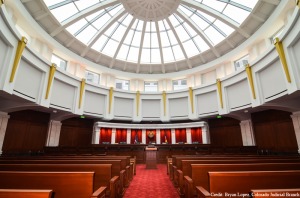The courts keep knocking down TABOR-based lawsuits, but the tax law’s defenders keep coming back for more punishment.
Maybe they’ll win one someday. Hope can be found in a recent ruling in the TABOR Foundation’s lawsuit filed against the Colorado Bridge Enterprise in 2012, even though the foundation lost.
![]() The CBE was established in 2009 by the General Assembly’s so-called “FASTER” Act as a “government-owned business” within the Colorado Department of Transportation. The additional bridge repairs were to be funded by increases averaging $41 in auto registration fees and much higher penalties for late payment.
The CBE was established in 2009 by the General Assembly’s so-called “FASTER” Act as a “government-owned business” within the Colorado Department of Transportation. The additional bridge repairs were to be funded by increases averaging $41 in auto registration fees and much higher penalties for late payment.
The TABOR Foundation claimed they weren’t fees but taxes that voters weren’t given the opportunity to approve. What’s more, it said that the CBE didn’t qualify as a TABOR-exempt enterprise because it received more than 10 percent of its revenue from state grants.
The plaintiffs lost at the trial court, lost at the Colorado Court of Appeals and, the other day, the Colorado Supreme Court decided it wouldn’t even deign to review the case.
This outcome was predictable, thanks primarily to the high court’s Barber v. Ritter decision in 2008. In that case, the plaintiffs complained that the cash-strapped legislature seized the proceeds from 31 cash funds and deposited them into the general fund, where they were spent on purposes unrelated to the regulatory purposes of the cash funds.
The supreme court, which historically has hated the Taxpayer’s Bill of Rights, held that it didn’t matter how the money was ultimately spent. So long as the fee was ostensibly collected for a specific purpose it was a fee, not a tax, and didn’t need a public vote.

But here’s the key phrase in the appeals court ruling in the TABOR Foundation case: “We conclude that the bridge safety surcharge fee is raised solely for the purposes outlined in the CBE’s enabling statute and not to defray the costs of general state expenses, which again weighs in favor of the determination that the surcharge is a fee, not a tax.”
That should give hope to the National Federation of Independent Business, plaintiffs in another ongoing TABOR suit. Last December it sued the Colorado secretary of state on grounds that its members, and all other Colorado businesses, had to pay higher fees than necessary in order to fund the state government’s entire share of Colorado’s election expenses, which include payments to counties.
The secretary of state gets no general fund appropriations and must support itself through fees charged. Years ago the legislature established the fees but in the late 1980s it directed the office to charge whatever was necessary to cover the costs of elections as well as business regulation.
According to the NFIB suit, fees paid by businesses have quadrupled over the past two decades, from $4.19 million in fiscal 1991 to $18.69 million in fiscal 2014.
Let’s concede that the business community doesn’t automatically inspire much public sympathy, and the average citizen might shrug and think perhaps that business fees ought to cover election costs.
But you can’t blame businesses, most of which are quite small, from complaining about this burden. After all, thanks to the Gallagher Amendment of 1982, they also have to pay disproportionately high property taxes as well. And the more businesses have to pay in fees, the more you have to pay for their products and services.
The state and the NFIB have been negotiating since the suit was filed, and on June 30 both recently signed off on 12 pages of stipulated facts. On the same day each side filed motions for summary judgment in order to expedite a decision. Oral arguments will be heard by Denver District Judge A. Bruce Jones on Sept. 11.
The NFIB asks the court to enjoin the secretary of state from assessing business and licensing charges that aren’t “reasonably related” to business.

The motion quotes more from the unsuccessful TABOR Foundation suit against the CBE: “If the language states that a primary purpose is to raise revenues for general governmental spending, it is a tax; but if it indicates that the primary purpose of the charge is to finance a particular service, then the charge is a fee.”
The NFIB points out that the state argues that any charge might evade classification as a “tax” so long as it used to fund any function entrusted to that agency by statute. If that were true, the state could collect any number of unrelated governmental functions into a single so-called department and fund it through a fee imposed on a very narrow class.
Taken to its logical conclusion, argues the NFIB, “the defendants’ theory would permit the General Assembly to go so far as to declare in a single-sentence statutory amendment that the entirety of the Department of Transportation is henceforth reclassified as a division of the Department of State to be financed by the cash fund, and thus through business and licensing charges.”
Presumably the loser in the case will appeal to the state supreme court. The plaintiffs have to take heart in the fact that the court is at least slightly more conservative than it has been, thanks to recent appointments by Gov. John Hickenlooper.
Longtime Rocky Mountain News political columnist Peter Blake now writes twice a month for CompleteColorado.com. Contact him at pblake0705@comcast.net You may re-publish his work at no charge and without further permission; please give full credit to Peter Blake and www.CompleteColorado.com.


